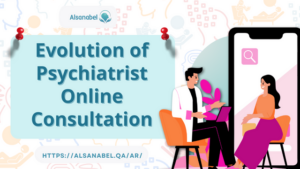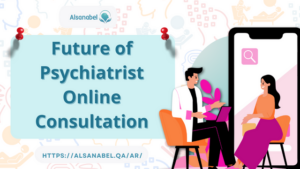The Impact of Technology on Psychiatrist Online Consultation 2024
- Category online psychiatric
The landscape of mental health support is evolving with the integration of technology in psychiatric care. Online consultations with psychiatrists are becoming increasingly popular, offering a convenient and accessible way for individuals to seek mental health support. The use of secure and confidential virtual platforms such as video calls, voice calls, and text-based communication is transforming the traditional therapy experience. In this blog post, we will delve into the impact of technology on psychiatrist online consultation, exploring the benefits and implications of this digital shift in mental health care.
Evolution of Psychiatrist Online Consultation
The evolution of Psychiatrist Online Consultation has transformed mental healthcare delivery, offering significant advancements:

- Accessibility: Online consultations improve access to mental health services, particularly for those in remote or underserved areas, by eliminating geographical barriers and transportation issues.
- Convenience: Patients can schedule appointments at their convenience, reducing travel time and waiting periods, thus encouraging more people to seek help for mental health concerns.
- Anonymity and Privacy: Online consultations provide a level of anonymity and privacy, allowing patients to discuss sensitive issues comfortably from their chosen location.
- Technological Advancements: Secure platforms and encryption ensure the confidentiality of patient information, supported by user-friendly video conferencing and messaging apps.
- Multidisciplinary Collaboration: Online consultations facilitate collaboration among mental health professionals, enabling holistic treatment approaches tailored to individual needs.
- Remote Monitoring and Support: Integration of digital tools allows for remote monitoring of symptoms and progress, enabling ongoing support and intervention as needed.
- Crisis Intervention and Suicide Prevention: Online consultations offer immediate access to mental health support, crucial for crisis intervention and suicide prevention efforts, through crisis hotlines and telepsychiatry platforms.
Overall, online psychiatric consultations represent a paradigm shift in mental healthcare, leveraging technology to enhance access, convenience, and quality of care, with the potential to address the global burden of mental illness effectively.
Benefits of Technology in Psychiatric Consultations
Technology has revolutionized psychiatric consultations, offering numerous benefits for both patients and healthcare providers:
- Increased Access: Technology eliminates geographical barriers, enabling patients from rural or remote areas to access psychiatric consultations.
- Convenience: Telepsychiatry allows patients to schedule appointments at their convenience, particularly beneficial for those with busy schedules or mobility issues.
- Enhanced Privacy: Secure communication channels and encrypted data transmission ensure patient privacy and confidentiality.
- Cost Savings: Virtual consultations often incur lower costs, making mental healthcare more affordable by reducing transportation and associated expenses.
- Continuity of Care: Seamless communication between healthcare providers ensures continuity of care, with collaboration on treatment plans and monitoring patient progress.
- Improved Patient Engagement: Digital tools empower patients to take an active role in their treatment, leading to better adherence and outcomes.
- Remote Monitoring: Wearable devices and mobile apps enable real-time monitoring of symptoms, medication adherence, and overall well-being, facilitating proactive intervention.
- Crisis Intervention: Technology provides immediate access to mental health support during crises, potentially saving lives in critical situations.
- Expanded Reach: Telepsychiatry extends the reach of psychiatrists to underserved populations, including those in correctional facilities or remote communities.
- Research and Innovation: Technology drives research and innovation in psychiatry, enabling the development of novel interventions and cutting-edge technologies such as virtual reality therapy and AI-driven diagnostics.
Overall, technology has the potential to transform psychiatric consultations, making mental healthcare more accessible, affordable, and effective worldwide.
Role of Artificial Intelligence in Online Psychiatry
Artificial intelligence (AI) is reshaping online psychiatry with several capabilities:
- Risk Assessment and Prediction: AI analyzes patient data to predict mental health risks, aiding early intervention.
- Personalized Treatment: AI tailors treatment plans based on individual factors like genetics and lifestyle.
- Symptom Monitoring: AI-powered chatbots offer continuous symptom monitoring and support between sessions.
- Natural Language Processing: NLP helps analyze patient communications for insights into mental health status.
- Diagnostic Support: AI assists clinicians in diagnosing mental health conditions by analyzing patient data.
- Teletherapy: AI-powered platforms provide virtual counseling sessions, enhancing access to therapy.
- Early Intervention: AI identifies individuals at risk and offers targeted interventions to prevent mental health conditions.
- Research: AI accelerates research efforts, aiding in treatment discovery and clinical trial efficiency.
Overall, AI enhances diagnostic accuracy, personalizes treatment, improves patient engagement, and expands access to mental health services in online psychiatry. However, ethical considerations and human oversight are essential in AI-driven mental healthcare.
Telemedicine Platforms for Mental Health
Telemedicine platforms offer convenient access to mental health services. Here are popular platforms tailored for mental health:
- BetterHelp: Provides online therapy with licensed counselors via messaging, live chat, phone calls, or video conferencing.
- Talkspace: Offers online therapy with licensed therapists, featuring unlimited messaging therapy and live video sessions.
- Amwell: Offers telepsychiatry services connecting individuals with board-certified psychiatrists for virtual appointments.
- MDLive: Provides virtual psychiatry services, offering appointments with psychiatrists for evaluations, medication management, and therapy sessions.
- Doctor on Demand: Offers mental health services connecting patients with licensed psychiatrists and therapists via video calls.
- Ginger: Provides on-demand mental health support with access to therapists, coaches, and psychiatrists for therapy sessions and medication management via video calls or messaging.
These platforms offer therapy, counseling, medication management, and psychiatric evaluations, making mental healthcare accessible and convenient.
Future of Psychiatrist Online Consultation
The impact of technology on the future of online psychiatric consultation is profound and diverse:

- Accessibility: Technology breaks down barriers, enabling individuals to access mental health services regardless of location or circumstance, thus benefiting underserved populations.
- Convenience: Online consultations remove travel time and waiting room constraints, fostering more convenient access to mental healthcare and encouraging early intervention.
- Flexibility: Technology allows for flexible scheduling, accommodating diverse schedules and increasing patient engagement in treatment.
- Anonymity and Privacy: Online platforms offer privacy and anonymity, reducing stigma and facilitating open discussions about sensitive mental health issues.
- Specialized Care: Technology enables access to specialized psychiatric care, ensuring tailored treatment for individual needs.
- Remote Monitoring and Support: Wearable devices and mobile apps enable remote symptom monitoring and support, aiding clinicians in tracking progress and intervening as needed.
- Integration of Artificial Intelligence (AI): AI tools assist in diagnosing and treating mental health conditions effectively by analyzing data, providing treatment recommendations, and personalizing interventions.
Overall, technology revolutionizes psychiatric care, enhancing accessibility, convenience, and personalization. Continued technological advancements promise further innovations in online psychiatric consultation, improving effectiveness and efficiency.
As we conclude our exploration of the impact of technology on psychiatrist online consultation, I encourage you to share your thoughts and experiences with us. How do you think technology has changed the way mental health services are accessed and provided? Your insights are valuable as we continue to navigate the ever-evolving landscape of healthcare. Thank you for joining us on this journey.









